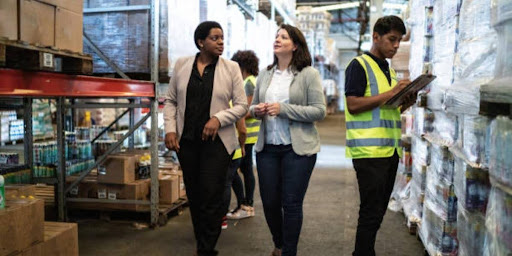Power Articles
Industry Elevating Content
Collaborating with Suppliers: A Key to Success in Home Renovation

PowerArticles
Sept. 30, 2024
In the world of home renovation, the quality of your work is only as good as the materials you use. This is why building strong relationships with suppliers is crucial for success in the home improvement industry. Good supplier relationships can make the difference between a smooth, profitable project and one plagued by delays, quality issues, and unhappy customers.
Strong supplier collaborations offer numerous benefits. They can lead to better product quality, more competitive pricing, access to innovative materials, improved project planning, and ultimately, higher customer satisfaction. By working closely with suppliers, home renovation companies can gain a significant edge in a competitive market.
Building Strong Supplier Relationships
To create effective partnerships with suppliers, home improvement companies should focus on several key areas:
Identifying reliable suppliers
Start by researching and vetting potential suppliers. Look for those with a good reputation in the industry, a history of reliable deliveries, and high-quality products. Don’t hesitate to ask for references or samples before committing to a partnership.
Establishing clear communication channels
Open and frequent communication is vital. Set up regular check-ins, whether through phone calls, emails, or in-person meetings. Make sure both parties understand the preferred methods and frequency of communication.
Developing trust and mutual respect
Trust is the foundation of any good relationship, including business partnerships. Be honest about your needs and expectations, and follow through on your commitments. Show respect for your suppliers’ expertise and time.
Creating long-term partnerships
While it might be tempting to switch suppliers for a slightly better price, long-term partnerships often provide more value. They allow for deeper understanding, customized solutions, and preferential treatment over time.

Benefits of Effective Supplier Collaboration
When home renovation companies collaborate effectively with suppliers, they can enjoy several significant benefits:
Improved product quality and consistency
Close relationships with suppliers often lead to better quality control. Suppliers are more likely to understand your specific needs and maintain consistent quality when they have a strong, ongoing partnership with you.
Better pricing and potential cost savings
Long-term partnerships often lead to more favorable pricing. Suppliers may offer discounts for bulk purchases or loyalty, leading to cost savings that can be passed on to customers or improve your profit margins.
Access to new and innovative materials
Good supplier relationships can give you early access to new products or materials. Suppliers often share innovations with their best customers first, giving you a competitive edge in the market.
Enhanced project planning and execution
When you have a strong relationship with your suppliers, you can better coordinate deliveries and manage your project timeline. This leads to smoother project execution and fewer delays.
Increased customer satisfaction
All these benefits culminate in increased customer satisfaction. When you have quality materials, delivered on time, at a good price, you’re better equipped to meet or exceed your customers’ expectations.
Streamlining the Supply Chain
Effective collaboration with suppliers can help streamline your supply chain, leading to more efficient operations:
Implementing just-in-time inventory management
Work with suppliers to implement a just-in-time inventory system. This reduces storage costs and minimizes waste, especially important for materials with a limited shelf life.
Utilizing supplier portals and digital tools
Many suppliers offer online portals or digital tools for ordering, tracking shipments, and managing accounts. Take advantage of these to streamline your processes and improve efficiency.
Coordinating delivery schedules
Work closely with suppliers to coordinate delivery schedules that align with your project timelines. This can help reduce on-site storage needs and ensure materials are fresh when used.
Managing stock levels efficiently
With good supplier relationships, you can more effectively manage your stock levels. Suppliers can help you predict needs based on past orders and industry trends, ensuring you’re neither overstocked nor running short of essential materials.

Collaborative Problem-Solving
Strong supplier relationships really show their value when problems arise. Collaborative problem-solving can turn potential crises into manageable situations:
Addressing quality issues together
If quality issues occur, a good supplier relationship allows for open discussion and quick resolution. Suppliers are more likely to prioritize your concerns and work towards a solution when you have a strong partnership.
Finding solutions for supply shortages
In times of material shortages, strong supplier relationships can be invaluable. Your suppliers may be able to prioritize your orders or suggest alternative materials to keep your projects on track.
Adapting to market changes and trends
Suppliers often have a broad view of the market. They can provide insights into emerging trends, helping you adapt your offerings to stay competitive.
Sharing industry insights and forecasts
Regular communication with suppliers can provide valuable industry insights. They may share forecasts about material availability or pricing trends, helping you plan more effectively for the future.
Leveraging Supplier Expertise
Suppliers are often experts in their products and can provide invaluable guidance on how to best use them in home renovation projects.
Product knowledge and application guidance from suppliers can help you choose the right materials for each job, ensuring better results and higher customer satisfaction. Many suppliers also offer training and education opportunities, which can help your team stay up-to-date with the latest products and installation techniques.
Technical support and troubleshooting assistance from suppliers can be crucial when facing unexpected challenges on a project. Some suppliers may even work with you on custom product development, creating unique solutions for specific renovation needs.
Negotiating Win-Win Agreements
Successful collaboration with suppliers relies on negotiating agreements that benefit both parties. This starts with understanding each party’s needs and constraints. Be open about your requirements and listen to your supplier’s limitations to find common ground.
Establishing fair pricing structures is crucial. While it’s important to get competitive prices, remember that extremely low prices might compromise quality or reliability. Focus on value rather than just cost.
Setting realistic delivery expectations is essential for smooth project management. Discuss lead times openly and factor in potential delays when planning your projects.
Creating flexible terms for changing market conditions can help maintain a strong relationship through ups and downs. Consider including clauses that allow for price adjustments based on significant market changes.

Managing Multiple Supplier Relationships
Most home renovation companies work with multiple suppliers. Balancing exclusive and non-exclusive partnerships can help you secure preferential treatment while maintaining flexibility.
Diversifying your supplier base can reduce risk and ensure you always have access to the materials you need. However, it’s important to maintain consistency across different suppliers to ensure uniform quality in your projects.
Regularly evaluating and comparing supplier performance can help you make informed decisions about which relationships to prioritize and where improvements are needed.
Technology in Supplier Collaboration
Technology plays a crucial role in modern supplier collaboration. Project management software can help coordinate deliveries and track material usage across multiple projects.
Implementing shared inventory systems with your suppliers can improve efficiency and reduce the risk of stockouts. Data analytics can be leveraged for better forecasting, helping both you and your suppliers plan more effectively.
Emerging technologies like blockchain are beginning to impact supply chain management, offering potential improvements in traceability and transparency.
Overcoming Common Challenges
Even the strongest supplier relationships face challenges. Supply chain disruptions, such as those seen during the COVID-19 pandemic, can strain relationships and require creative problem-solving.
Managing supplier conflicts, whether related to pricing, quality, or delivery, requires diplomacy and clear communication. Be prepared to adapt to changes in supplier businesses, such as mergers or shifts in product lines.
Maintaining quality control across suppliers is crucial for consistent results in your projects. Regular quality checks and open feedback can help address issues before they impact your work.
Conclusion
Strong supplier collaboration is a key factor in the success of home renovation companies. By leveraging supplier expertise, negotiating win-win agreements, effectively managing multiple relationships, embracing technology, and overcoming common challenges, you can create a robust supply chain that supports your business goals.
Investing time and resources into building and maintaining strong supplier relationships can lead to improved project outcomes, increased efficiency, and higher customer satisfaction. For home improvement companies looking to gain a competitive edge, focusing on supplier collaboration is a strategy that can yield significant long-term benefits.
Published By
PowerArticles
Sept. 30, 2024